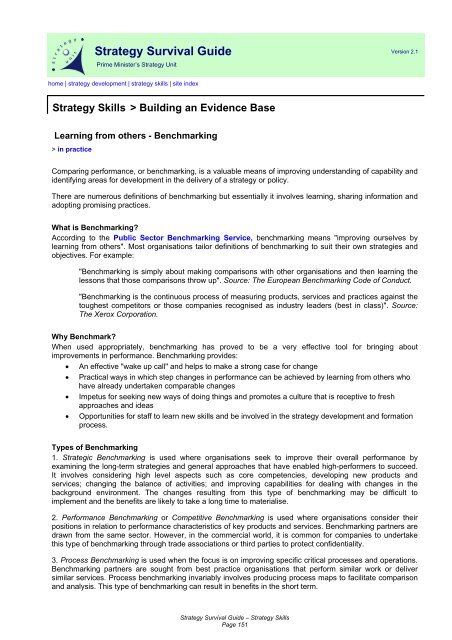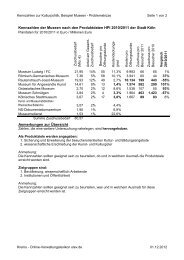Strategy Survival Guide
Strategy Survival Guide
Strategy Survival Guide
You also want an ePaper? Increase the reach of your titles
YUMPU automatically turns print PDFs into web optimized ePapers that Google loves.
<strong>Strategy</strong> <strong>Survival</strong> <strong>Guide</strong> Version 2.1<br />
Prime Minister’s <strong>Strategy</strong> Unit<br />
home | strategy development | strategy skills | site index<br />
<strong>Strategy</strong> Skills > Building an Evidence Base<br />
Learning from others - Benchmarking<br />
> in practice<br />
Comparing performance, or benchmarking, is a valuable means of improving understanding of capability and<br />
identifying areas for development in the delivery of a strategy or policy.<br />
There are numerous definitions of benchmarking but essentially it involves learning, sharing information and<br />
adopting promising practices.<br />
What is Benchmarking?<br />
According to the Public Sector Benchmarking Service, benchmarking means "improving ourselves by<br />
learning from others". Most organisations tailor definitions of benchmarking to suit their own strategies and<br />
objectives. For example:<br />
"Benchmarking is simply about making comparisons with other organisations and then learning the<br />
lessons that those comparisons throw up". Source: The European Benchmarking Code of Conduct.<br />
"Benchmarking is the continuous process of measuring products, services and practices against the<br />
toughest competitors or those companies recognised as industry leaders (best in class)". Source:<br />
The Xerox Corporation.<br />
Why Benchmark?<br />
When used appropriately, benchmarking has proved to be a very effective tool for bringing about<br />
improvements in performance. Benchmarking provides:<br />
• An effective "wake up call" and helps to make a strong case for change<br />
• Practical ways in which step changes in performance can be achieved by learning from others who<br />
have already undertaken comparable changes<br />
• Impetus for seeking new ways of doing things and promotes a culture that is receptive to fresh<br />
approaches and ideas<br />
• Opportunities for staff to learn new skills and be involved in the strategy development and formation<br />
process.<br />
Types of Benchmarking<br />
1. Strategic Benchmarking is used where organisations seek to improve their overall performance by<br />
examining the long-term strategies and general approaches that have enabled high-performers to succeed.<br />
It involves considering high level aspects such as core competencies, developing new products and<br />
services; changing the balance of activities; and improving capabilities for dealing with changes in the<br />
background environment. The changes resulting from this type of benchmarking may be difficult to<br />
implement and the benefits are likely to take a long time to materialise.<br />
2. Performance Benchmarking or Competitive Benchmarking is used where organisations consider their<br />
positions in relation to performance characteristics of key products and services. Benchmarking partners are<br />
drawn from the same sector. However, in the commercial world, it is common for companies to undertake<br />
this type of benchmarking through trade associations or third parties to protect confidentiality.<br />
3. Process Benchmarking is used when the focus is on improving specific critical processes and operations.<br />
Benchmarking partners are sought from best practice organisations that perform similar work or deliver<br />
similar services. Process benchmarking invariably involves producing process maps to facilitate comparison<br />
and analysis. This type of benchmarking can result in benefits in the short term.<br />
<strong>Strategy</strong> <strong>Survival</strong> <strong>Guide</strong> – <strong>Strategy</strong> Skills<br />
Page 151
















